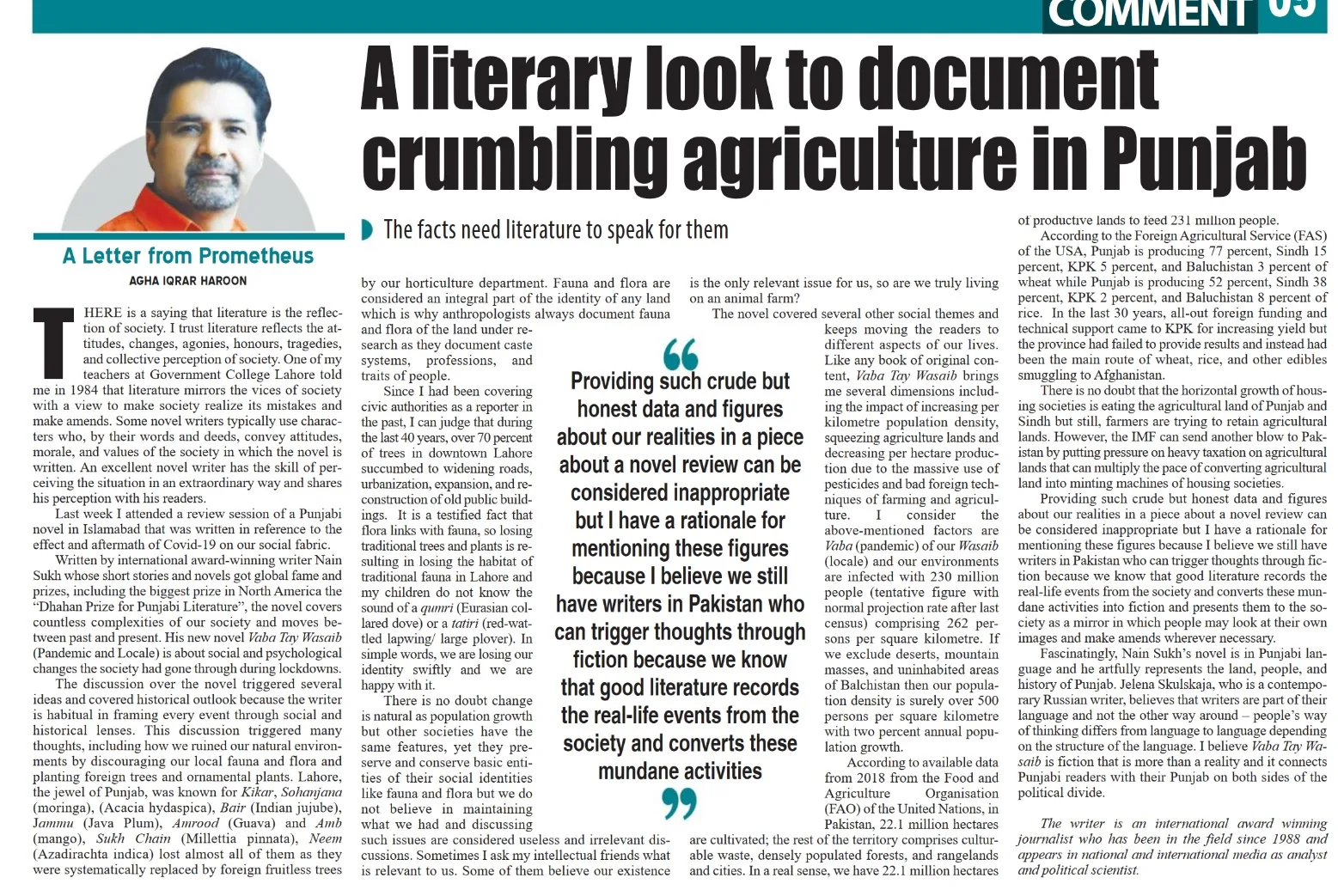By Agha Iqrar Haroon
There is a saying that literature is the reflection of society. I trust literature reflects the attitude, changes, agonies, honours, tragedies, and collective perception of society.
One of my teachers at Government College Lahore told me in 1984 that literature mirrors the vices of society with a view to make society realize its mistakes and make amends. Some Novel writers typically use characters who, by their words and deeds convey attitudes, morale, and values of the society in which the novel is written. An excellent novel writer has the skill of perceiving the situation in an extraordinary way and shares his perception with his readers.
Last week I attended a review session of a Punjabi novel in Islamabad that was written in reference to the effect and aftermath of Covid-19 on our social fabric.
Written by international award-winning writer Nain Sukh whose short stories and novels got global fame and prizes including the biggest prize in North America the “Dhahan Prize for Punjabi Literature”, the novel covers countless complexities of our society and moves between past and present. His new novel Vaba Tay Waseeb (pandemic and locale) is about social and psychological changes the society had gone through during lockdowns.
The discussion over the novel triggered several ideas and covered historical outlook because the writer is habitual in framing every event through social and historical lenses. This discussion triggered many thoughts including how we ruined our natural environments by discouraging our local fauna and flora and planting foreign trees and ornamental plants. Lahore, the jewel of Punjab was known for Kikar, (Acacia hydaspica), Sohanjana (moringa), Bair (Indian jujube), Jammu (Java Plum), Amrood (Guava) and Amb (mango), Sukh Chain (Millettia pinnata), Neem (Azadirachta indica) but now lost almost all of them as they were systematically replaced by foreign fruitless trees by our horticulture department. Fauna and flora are considered an integral part of the identity of any land which is why anthropologists always document faunas and floras of land under research as they document caste systems, professions, and traits of people. Since I had been covering civic authorities as a Reporter in the past, I can judge that during the last 40 years, over 70 percent of trees in downtown Lahore succumbed to widening roads, urbanization, expansion, and reconstruction of old public buildings. It is a testified fact that flora links with fauna so losing traditional trees and plants is resulting in losing the habitation of traditional faunas in Lahore and my children do not know the sound of a Qumri (Eurasian collared dove) or a Tatiri (red-wattled lapwing/ large plover). In simple words, we are losing our identity swiftly and we are happy with it.
There is no doubt change is natural as population growth but other societies have the same features they preserve and conserve basic entities of their social identities like faunas and floras but we do not believe in maintaining what we had and conversing such issues are considered useless and irrelevant discussions. Sometimes I ask my intellectual friends what is relevant to us. Some of them believe our existence is the only relevant issue for us, so are we truly living on an animal farm?
The novel covered several other social themes and keeps moving the readers to different aspects of our lives. Like any book of original content, Vaba Tay Wasaib brings me several dimensions including the impact of increasing per kilometer population density, squeezing agriculture lands, and decreasing per hectare production due to the massive use of pesticides and bad foreign techniques of farming and agriculture. I consider the above-mentioned factors are Vaba (pandemic) of our Wasaib (locale) and our environments are infected with 23 million people (tentative figure with normal projection rate after last census) comprising 262 persons per square density rate. If we exclude deserts, mountain masses, and unhabituated areas of Baluchistan then our density is surely over 500 persons per square kilometer with two percent annual population growth.
According to available data documented in 2018 by the Food and Agriculture Organisation (FAO) of the United Nations Pakistan, 22.1 million hectares are cultivated; the rest of the territory is comprised of culturable waste, densely populated forests, and rangelands and cities. In a real sense, we have 22.1 million productive lands to feed 231 million population per year.
According to the Foreign Agricultural Service (FAS) of the United States, Punjab is producing 77%, Sindh 15%, KPK 5%, and Baluchistan 3% of wheat while Punjab is producing 52%, Sindh 38%, KPK 2%, and Baluchistan 8% of rice. In the last 30 years, all-out foreign funding and technical support came to KPK for increasing yield but the province had failed to provide results but had been the main route of wheat, rice, and other edibles smuggling to Afghanistan.
There is no doubt that the horizontal growth of housing societies is eating the agricultural land of Punjab and Sindh but still, farmers are trying to retain agricultural lands. However, IMF can send another blow to Pakistan by putting pressure on heavy taxation on agricultural lands that can multiply the pace of converting agricultural land into minting machines of housing societies.
Providing such crude but honest data and figures about our realities in a piece about a novel review can be considered inappropriate but I have a rationale for mentioning these figures because I believe we still have writers in Pakistan who can trigger thoughts through fiction because we know that good literature records the real-life events from the society and converts these mundane activities into fiction and presents them to the society as a mirror in which people may look at their own images and make amends wherever necessary. Fascinatingly, Nain Sukh’s novel is in Punjabi language and he artfully represents the land, people, and history of Punjab. Jelena Skulskaja, who is a contemporary Russian writer believes that writers are part of their language and not the other way around – people’s way of thinking differs from language to language depending on the structure of the language. I believe Vaba Tay Waseeb is fiction that is more than a reality and it connects Punjabi readers with their Punjab on both sides of the political divide.





